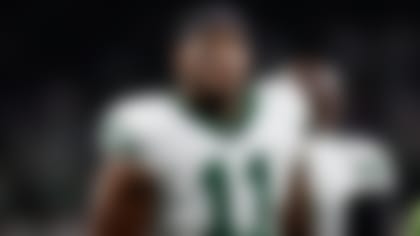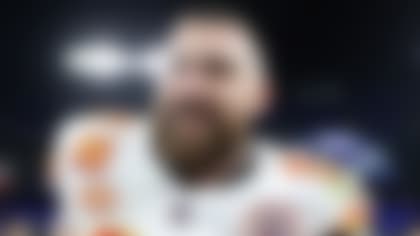This was the season when it was all supposed to come apart on Bill Belichick.
All signs clearly pointed in that direction after the New England Patriots' playoff mugging at the hands of the Baltimore Ravens last season.
An offseason roster makeover left him frighteningly young at multiple positions, especially on defense. He would still be without any assistant coaches deemed worthy of wearing the title of coordinator. He would enter his second year without his ace personnel man, Scott Pioli, who had gone onto become general manager of the Kansas City Chiefs (also the landing spot of Belichick's two best coordinators, Charlie Weis and Romeo Crennel).
As brilliant and as accomplished a head coach as Belichick might be, he would never be able to fend off the impending disaster or, at the very least, prevent another team -- likely the New York Jets -- from becoming the new kingpin of the AFC East.
Sure, he wouldn't. Look at whose team shares the NFL's best record at 9-2, has won four of its last five games and is riding a three-game winning streak.
Brady has been great. Belichick's performance has been greater. By far, this has been the greatest coaching job of his career.
That isn't an easy conclusion to make about a man who has guided his team to three Super Bowl victories. In fact, it almost sounds downright silly for someone whose résumé has long been packed, addressed, stamped, and ready for the Pro Football Hall of Fame, where it will join the game plan he prepared as defensive coordinator of the New York Giants for their Super Bowl XXV smothering of Buffalo's K-Gun offense. It also is something that doesn't resonate quite as much in Week 13 as it would if the Patriots were preparing for another Super Bowl.
Yet, it is true. The evidence is indisputable.
Let's start with that youthful roster. Even the most talented young players need to be "coached up" to the level that they can make an immediate contribution. Belichick has done just that while, by the way, working with players he selected. He has them focused. He has them playing with poise. He has them fully embracing the "Patriot Way," which is all about putting team success ahead of individual accomplishment.
Some of these kids recite that mantra in their sleep.
Inexperience is a larger problem on defense, where the Pats' next-to-last-ranking in the NFL is something one wouldn't expect from a 9-2 team. Through most of their Super Bowl run, from 2001 to 2007, the Patriots were loaded with veteran defensive players who knew how to execute Belichick's complicated scheme. The current unit is learning on the fly. Many of the lessons have been tough, although there have been instances -- such as when the Patriots intercepted Peyton Manning three times, including one in the final moments, to decide their 31-28 win over the Colts -- in which players have risen to the occasion.
Credit Belichick for putting them in the right place to do so. He even managed to get Manning, as smart a quarterback as the NFL has ever seen, to lament after the game that the Patriots "never show you the same thing twice."
With Brady playing as well as ever, it's harder to see the challenges that youth presents to the Patriots' offense. But it does. Brady began the season with the two receivers, Wes Welker and Randy Moss, who were primarily responsible for allowing the quarterback and the rest of the unit to go off on a record-setting tear for points and passing in 2007. After Week 4, the Patriots traded Moss to Minnesota, leading many to assume that Belichick had compromised his team's ability to stretch defenses with Moss' speed just for the sake of grabbing a third-round draft pick for a receiver the team would have let go for nothing in the offseason.
There really was no compromise at all. Moss' departure allowed Belichick to fully implement an offense that spreads the field and calls for Brady to throw mostly short and intermediate passes to Welker, who excels at those routes, and rookie tight ends Aaron Hernandez and Rob Gronkowski. Belichick also brought Deion Branch back to the fold, giving Brady one more reliable target, while leaving the running game in the hands of a couple of scrappy unknowns, Danny Woodhead and BenJarvus Green-Ellis. And even without the deep threat of Moss, the Patriots still led the NFL in scoring after Week 12.
It isn't merely the formations Belichick employs that allows the offense to be so effective. It's also his willingness to constantly adjust his approach, before and during a game, depending on the opposition. In the Week 10 victory at Pittsburgh, Belichick correctly figured the best plan of attack was to force the Steelers' aging defenders to chase around the Patriots' young pass-catchers all night, so the Patriots wound up passing 43 times while running 24. Seven days later, in an effort to keep Manning on the sidelines as much as possible, the Patriots had 34 rushing attempts to 25 throws. And on Thanksgiving Day, after trailing 17-10 at halftime and 24-17 in the third quarter, Belichick made the necessary adjustments that allowed the Patriots to dominate the rest of the way for a 45-24 triumph.
And he does all this while choosing to wear both coordinator hats under his head-coaching cap.
On Monday night, the Patriots face the Jets, who have the league's second-ranked rushing attack and third-ranked defense. Even with three extra days of strategizing, Belichick will be hard-pressed to come up with a game plan that can trump a highly-talented team that pounded the Patriots, 28-14, in Week 2. Rex Ryan, Belichick's Jets counterpart, also had three extra days of preparation and can scheme with the best of them.
Belichick understands how quickly his team's fortunes could change and how, against elite competition, all of those youngsters could suddenly prove that they aren't ready for prime time.
"We've still got a long ways to go," he told reporters in New England Thursday. "There're a lot of things that we can do better. It certainly helps having experience at the quarterback position; that's been a big factor. Wes has given us a lot of leadership and execution there at the receiver position. So has Deion since he's been here. Young guys are working hard; they're coming along, but they've got a long way to go."
True. But they've been running this marathon for a while, and it hasn't been on the flattest of courses. Some of the Pats' roster turnover has been involuntary. They've been hit hard with injuries, losing defensive end Ty Warren, cornerback Leigh Bodden, running back Kevin Faulk, guard Stephen Neal, and kicker Stephen Gostkowski for the season.
However, they continue to chug along because they know how to adapt and overcome, which is the essence of great coaching.
Typically, Belichick gives a bone-dry assessment of how his team has managed to overcome its shortcomings, talking about players "working every day, trying to get better, trying to improve, trying to do things well as a unit, as a team."
He isn't going to mention his contribution to all of this, but he doesn't have to.
The results speak for themselves. They say that this is his best coaching job... ever.
Follow Vic Carucci on Twitter @viccarucci.




